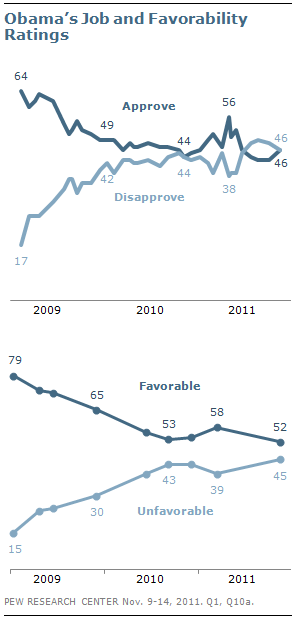 A year out from the 2012 election, as many Americans approve of the job Obama is doing as president (46%) as disapprove (46%). This marks a modest improvement from August and October when slightly more disapproved than approved of Obama’s job performance.
A year out from the 2012 election, as many Americans approve of the job Obama is doing as president (46%) as disapprove (46%). This marks a modest improvement from August and October when slightly more disapproved than approved of Obama’s job performance.
Obama continues to enjoy the support of young people and non-whites: Majorities of both groups say they approve of the job Obama is doing. By contrast, most whites and seniors disapprove of the president’s job performance. More independents disapprove (52%) than approve (40%) of the job Obama is doing. (For a breakdown of Obama job approval ratings, see detailed tables.)
As Obama’s job rating has drawn even, more continue to say they have a favorable, rather than unfavorable view of him. About half (52%) say they have either a very favorable (21%) or mostly favorable (31%) view of Obama. Fewer (45%) say they have either a very unfavorable (24%) or mostly unfavorable (21%) view of him. Since June 2010, Obama’s favorability ratings have held fairly steady, with only modest shifts in attitudes.
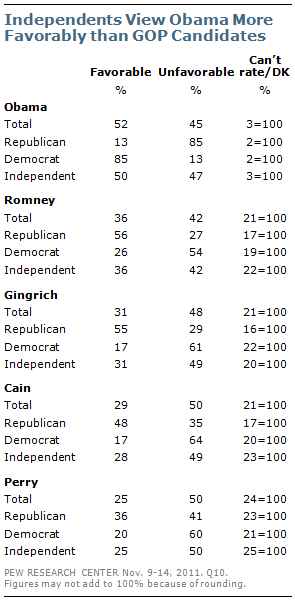 Obama’s positive favorability rating contrasts with the more negative ratings of leading GOP presidential candidates. More hold an unfavorable view of Mitt Romney (42%) than a favorable view (36%) of the former Massachusetts Governor. Other Republican candidates fare even worse: about half express unfavorable views of Rick Perry (50%), Herman Cain (50%) and Newt Gingrich (48%); less than a third hold a favorable view of each of these GOP candidates.
Obama’s positive favorability rating contrasts with the more negative ratings of leading GOP presidential candidates. More hold an unfavorable view of Mitt Romney (42%) than a favorable view (36%) of the former Massachusetts Governor. Other Republican candidates fare even worse: about half express unfavorable views of Rick Perry (50%), Herman Cain (50%) and Newt Gingrich (48%); less than a third hold a favorable view of each of these GOP candidates.
Among independents, about as many have a favorable opinion of Obama (50%) as an unfavorable view (47%). Just 36% have a favorable view of Romney. And far more independents hold an unfavorable view of Perry, Cain and Gingrich than view these candidates favorably.
Majorities of Republicans express favorable opinions of Romney (56%) and Gingrich (55%), while just 27% and 29%, respectively, have unfavorable views. Cain is viewed somewhat less positively by Republicans (48% favorable vs. 35% unfavorable). And about as many Republicans have an unfavorable opinion of Rick Perry (41%) as express a favorable opinion (36%).
Low Marks for Obama on Economy
On specific issues, Obama receives negative ratings for his handling of the economy, budget deficit and immigration policy; he fares better when it comes to his handling of energy policy and foreign policy.
Nearly six-in-ten (58%) disapprove of the way Obama is handling the economy, while just 35% approve. Negative ratings of Obama’s handling of the economy are nothing new – majorities have disapproved of his performance since the summer of 2009. Ratings of Obama’s handling of the budget deficit are similarly negative (57% disapprove, 34% approve) and, as with the economy, they have been negative for some time.
About half disapprove of how Obama is handling immigration policy (49%); 32% approve. On this issue, the public has consistently expressed more disapproval than approval since Pew Research first asked about immigration in November 2009.
Slim pluralities approve of how Obama is handling foreign policy (46%) and energy policy (44%). Obama has performed comparatively well on these issues over time: At no point have significantly more disapproved than approved of his handling of foreign or energy policy.
How Obama Compares with Past Presidents
In addition to his low approval ratings on the economy, most say Obama could be doing more to improve economic conditions. About six-in-ten (61%) say he could be doing more, while far fewer (35%) say he is doing as much as he can. These ratings have become somewhat more negative since February.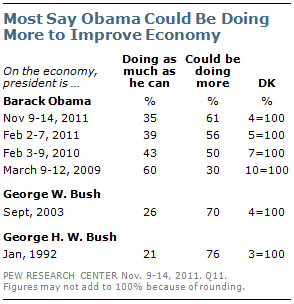
While negative, ratings of Obama’s economic efforts are better than those given to George W. Bush and George H.W. Bush at comparable points in their presidencies. In September 2003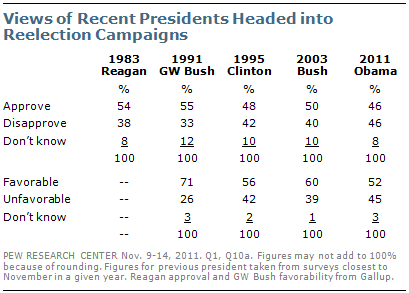 , roughly a year before the 2004 presidential election, 70% said Bush could be doing more to improve economic conditions and just 26% said he was doing all he could. Similarly, in January of 1992, 76% said George H. W. Bush could be doing more to improve the economy.
, roughly a year before the 2004 presidential election, 70% said Bush could be doing more to improve economic conditions and just 26% said he was doing all he could. Similarly, in January of 1992, 76% said George H. W. Bush could be doing more to improve the economy.
On the broader measures of approval and favorability, however, Obama lags behind previous presidents at comparable points in their terms. The incumbent presidents of the past two decades, from Reagan to George W. Bush, have had positive job approval ratings, on balance, a year ahead of the election. This is not the case for Obama, whose ratings are mixed.
Both George W. Bush and his father had significantly higher favorable ratings at this point in their presidencies than Obama does today. However, Obama’s favorable rating is about the same as Bill Clinton’s a year before he won reelection in 1996.
Ratings of Congressional Leaders
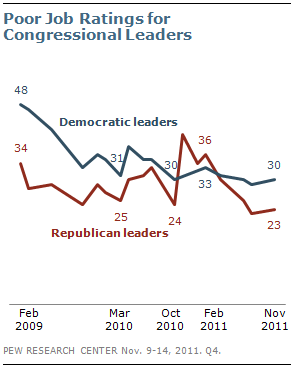 Republican and Democratic leaders in Congress receive highly negative job ratings. Just 23% approve of the job Republican congressional leaders are doing, while 67% disapprove. Ratings for Democratic leaders are not much better: 30% approve while 61% disapprove. Ratings of both parties’ leaders have shown little change since August.
Republican and Democratic leaders in Congress receive highly negative job ratings. Just 23% approve of the job Republican congressional leaders are doing, while 67% disapprove. Ratings for Democratic leaders are not much better: 30% approve while 61% disapprove. Ratings of both parties’ leaders have shown little change since August.
Independents hold about equally negative views of both parties’ leaders. Roughly seven-in-ten disapprove of Republican (70%) and Democratic (67%) congressional leaders.
Most Democrats (54%) approve of the job their own party’s leaders are doing, 37% disapprove. Ratings for Republican leaders are somewhat less positive among Republicans: 49% approve, 43% disapprove.
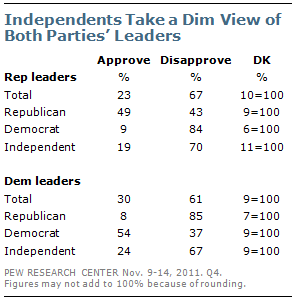 The job ratings for GOP leaders among Tea Party Republicans have improved since August, following the unpopular debt ceiling agreement between Obama and Republican leaders. Among Republicans and Republican-leaning independents who agree with the Tea Party movement, 49% approve of the job performance of Republican congressional leaders, while 43% disapprove. In late August, just 37% approved and 59% disapproved. There has been less change among non-Tea Party Republicans and leaners: 35% currently approve of the way Republican leaders are doing their jobs, little changed from late August (40%).
The job ratings for GOP leaders among Tea Party Republicans have improved since August, following the unpopular debt ceiling agreement between Obama and Republican leaders. Among Republicans and Republican-leaning independents who agree with the Tea Party movement, 49% approve of the job performance of Republican congressional leaders, while 43% disapprove. In late August, just 37% approved and 59% disapproved. There has been less change among non-Tea Party Republicans and leaners: 35% currently approve of the way Republican leaders are doing their jobs, little changed from late August (40%).


